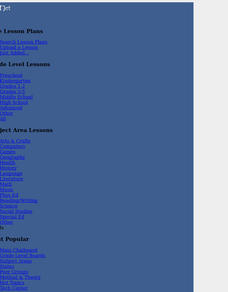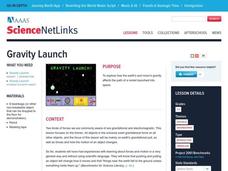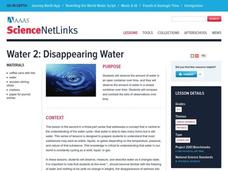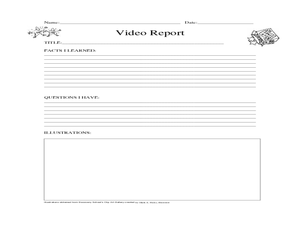Curated OER
Lesson Exchange: Kite Construction (Elementary, Science)
Students learn the technology of kite making and how to make a kite and fly a kite.
Scholastic
Study Jams! Vertebrates
Your back will be covered when you use this presentation to introduce beginning biologists to phylum chordata, the vertebrates. Five classes are defined: fish, amphibians, reptiles, birds, and mammals throughout the eight vibrant slides....
Cornell Lab of Ornithology
Amazing Birds
What's so amazing about birds? Find out just how amazing birds are with a physics of animal behavior unit created by Cornell Lab of Ornithology. Have learners explore and tap into their observational skills and notice how birds fly, what...
Polar Trec
Swan Savvy
Just like so many other birds, swans migrate during the cold winter months. Your class can gain a better understanding of migration and bird life as they act out some of the activities common to the tundra swan. They make a nest, sit on...
American Chemical Society
Investigating the Line
Note that this lesson is best paired with the preceding lesson in the unit. In that lesson, elementary physical scientists observed that the color coating of M&Ms® candies do not mix when dissolved off of the chocolate surface. Now...
Society of Petroleum Engineers
Renewable and Nonrenewable Energy
Energize an environmental science unit on natural resources with this collection of instructional materials. From simple coloring sheets for primary grade children, to guiding questions for a high school research...
Brooklyn Children’s Museum
Rocks and Minerals in Our Lives
Young geologists discover the important role that rocks and minerals play in our everyday lives through this series of hands-on activities. Starting off with a lesson that defines the difference between plants, animals, and...
Curated OER
Human Body Series - Respiratory System
Elementary schoolers play a respiratory relay toss in order to take in the respiratory system! They also create their own question cards based on several kid-friendly online articles about breathing and the health of the lungs. They use...
Pace University
Water Cycle
Rain, rain, go away—wait, there it is again! Elementary scientists learn how rain works its way through the stages of the water cycle with a series of classroom lessons and hands-on activities.
Kids Can Have Fun
Cut and Paste Fish
Just keep swimming with this colorful illustration of fish. This cut-and-paste activity can be used in multiple ways in an elementary classroom.
Curated OER
Who Lives in the Sea? A class book (Elementary, Science)
Students, assigned an alphabet letter, do research on a sea animal whose name begins with that assigned alphabet. All of the assignments then be turned into a class book.
Curated OER
Integrating Math and Science
Student understanding of math concepts improves when math is integrated with science!
Curated OER
What is Soil?
Students examine soil. In this earth science lesson, students define and describe weathering and erosion as it relates to soil. Students compare and contrast potting soil with forest soil and complete a science observation worksheet.
Curated OER
Designing a Germination Experiment - Part 1
Students experiment with seeds and germination. In this natural science lesson plan, students discuss the stages of germination. Students engage in a 4 part hands on science activity to view the process of germination.
Curated OER
Modeling changes to Ecosystems Part 1
Students record changes in an ecosystem. In this science instructional activity students make a hypothesis about changes in a terrarium. They record their observations. The students conduct an experiment to test their hypothesis.
Curated OER
The History and Nature of Science
Use children's literature, coupled with hands on lessons, to teach the history and nature of science.
Curated OER
Gravity Launch
Students examine how gravity affects launching rockets into space. In this physical science lesson plan, students review the concept of gravity and use an interactive online site, "Gravity Launch," to simulate a rocket launch.
Curated OER
Using Technology in Science
You can spice up your science content by incorporating technology into your lesson plans.
Curated OER
Teaching Measurement Through Science
Use these lesson plans to give your students real world practice with measuring distance, mass, and volume.
Curated OER
Disappearing Water
Students explore the water cycle. For this earth science lesson, students observe and measure water in a closed container and in an open container. Students record their observations and compare their sets of data to draw conclusions...
Curated OER
How Hot and How Big?
Young scholars explore star color and size. In this space science lesson plan, students conduct various inquiry activities to explore how the color of a star affects the amount of heat produced. They also investigate how the color of...
Curated OER
Organic Farming / Agriculture
Want an organic farming resource packed with experiments, background information, science fair projects, and topics of interest for further research? Here it is. Young environmental scientists can explore concepts involved in organic...
Curated OER
Whodunnit?
Want to create an exciting mystery activity? Investigators will identify the elements of a mystery, review mystery stories, then write their own mysteries. They engage in forensic science experiments related to mysteries and learn to ask...

























